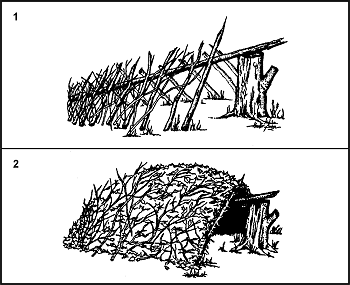Chapter 5
Shelters
TYPES OF SHELTERS
DEBRIS HUT
5-40. For warmth and ease of construction, the debris hut (Figure 5-11) is one of the best. When shelter is essential to survival, build this shelter.
Figure 5-11. Debris Hut
5-41. To make a debris hut, you should—
Build it by making a tripod with two short stakes and a long ridgepole or by placing one end of a long ridgepole on top of a sturdy base.
Secure the ridgepole (pole running the length of the shelter) using the tripod method or by anchoring it to a tree at about waist height.
Prop large sticks along both sides of the ridgepole to create a wedge-shaped ribbing effect. Ensure the ribbing is wide enough to accommodate your body and steep enough to shed moisture.
Place finer sticks and brush crosswise on the ribbing. These form a latticework that will keep the insulating material (grass, pine needles, leaves) from falling through the ribbing into the sleeping area.
Add light, dry, if possible, soft debris over the ribbing until the insulating material is at least 1 meter (3 feet) thick—the thicker the better.
Place a 30-centimeter (1-foot) layer of insulating material inside the shelter.
At the entrance, pile insulating material that you can drag to you once inside the shelter to close the entrance or build a door.
As a final step in constructing this shelter, add shingling material or branches on top of the debris layer to prevent the insulating material from blowing away in a storm.
Survival index
All text and images from the U.S. Army Field Manual 3-05.70: Survival.
Appearance of the materials from the U.S. Army Field Manual here does not constitute or represent endorsement by probablyhelpful.com.
ProbablyHelpful.com is not responsible for inaccurate or outdated information provided by the U.S. Army Field Manual 3-05.70.

